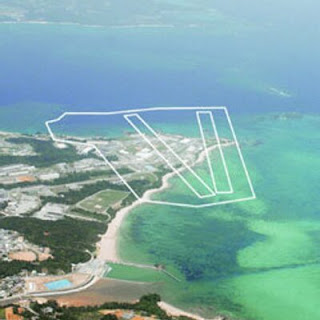The Okinawa Problem
Yesterday, I met the governor of Okinawa, Japan, The Honorable Denny Tamaki, who is visiting the US to gain support for decreasing the US military presence in Okinawa.
Governor Tamaki, who is half American, has a really hard job. Relocation of the Marine Corps Air Station Futenma has been in works for the last five decades. The Okinawa people don't want the base to be relocated to Henoko Bay within Okinawa for various reasons. The Japanese central government says that the current Okinawa governor has to honor the agreement signed by the previous governor who agreed to the relocation. The US government says that it is an internal Japanse matter and they don't want to interfere. 76% of the Okinawa population expresses opposition to building of a new base in Henoko Bay. What is a governor to do? He is traveling in the US to convince the congressmen and political advisors to gain support for the move of the US Futenma base outside of Okinawa. Maybe to Guam.
 |
| Oura Bay proposed site for the new base |
Brief history of Okinawa:
1429: Establishment of Ryukyu Kingdom
1879: Disposal of Ryukyu Kingdom (became Okinawa prefecture of Japan)
1945: The battle of Okinawa
1951: San Francisco Peace Treaty (restoration of sovereignty for Japan, Okinawa was under administration by the US military)
On a side note, karate comes from Okinawa.
Issues with the US base in Okinawa:
1. Governance: Even today, the land occupied by the US bases in Japan does not have to adhere to the local laws. The Japanese have no right to go inside the US bases. This is different than the US bases in Europe (e.g. Germany) where the US bases have to follow the local laws and the local government can enter the base. Until recently, most crimes and misdemeanors committed by the US military personnel, outside the US base, on Japanese soil, were not prosecuted under the Japanese law. Now, if the US military personnel are not on duty then they can be prosecuted under Japanese law for the crimes committed on Japanese soil.
2. Size: Of all the land occupied by the US military bases in Japan, 70% is in Okinawa while Okinawa has less than 1% of all the area in Japan.
3. Conflicts between the base and the local community: Noise pollution by the bases and the aircrafts, crimes (5,998 crimes associated with US bases since the Okinawa reversion to Japan, aircraft accidents (786). Crime examples: in 2017, a military personnel who is a former marine raped and murdered a woman and, earlier this year, a US navy service member belonging to the US Marine Corps in Okinawa killed a woman.
4. Opportunity cost: In calculations of the Okinawan government, if the land is returned to Okinawa then the direct impact on the local economy would be 28 times higher than what the US bases are contributing to the economy today.
5. Environment: Oura Bay at Henoko (where the new base is proposed to be built) has the world's leading level of biodiversity - 5,800 species including 262 endangered species. The plan is to land fill the ocean in Henoko.
How would you solve the Okinawa problem?
